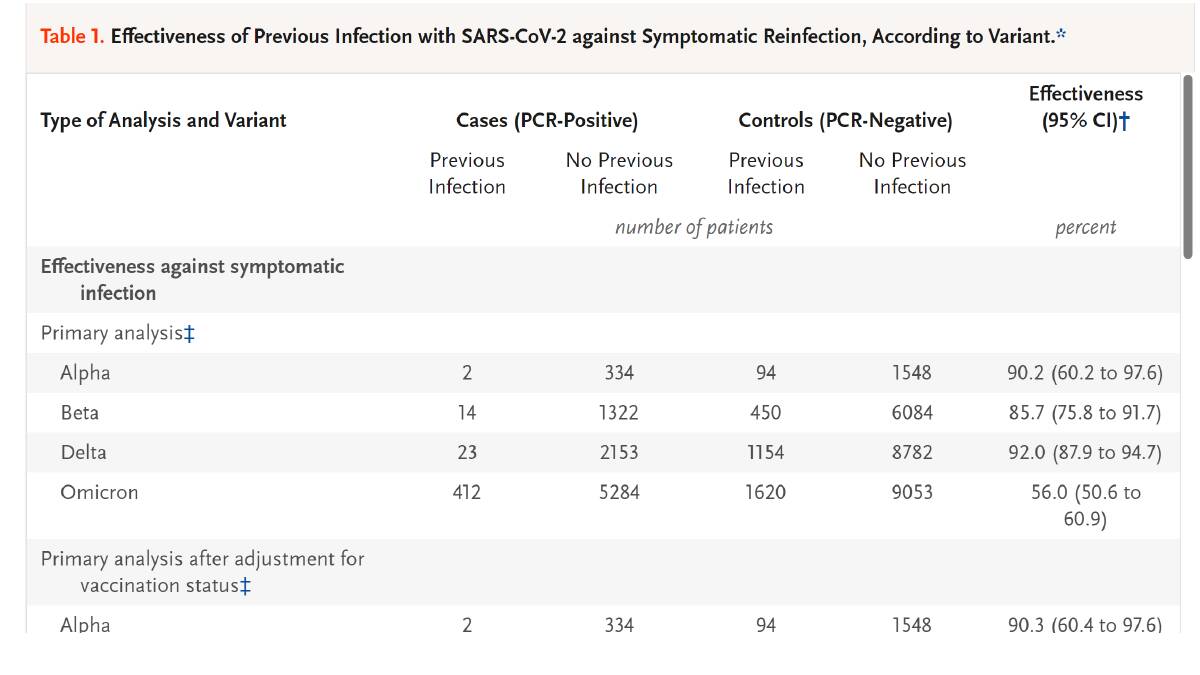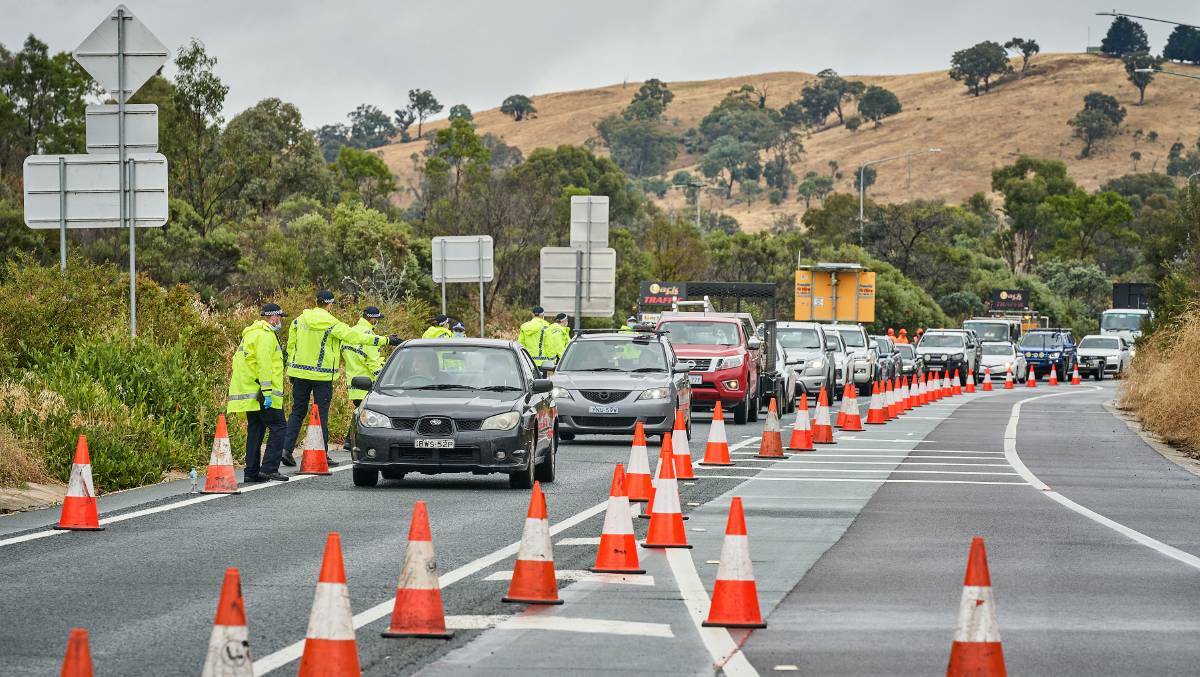A study into the natural immunity of COVID-19 patients in Qatar has indicated a strong link between prior infection with any variant, and protection from re-infection.
The peer-reviewed observational study by Weill Cornell Medicine, Qatar, measured the immune response of patients soon after they were rendered positive to the virus on PCR test.
It found that having previously had COVID-19 may offer up to 56 per cent protection against the Omicron variant, 90.2 per cent protection against the Alpha variant, 85.7 per cent against the Beta, and 92 per cent against the Delta.
When prior infection was coupled with recent vaccination, the likelihood of requiring hospitalisation due to severe, critical or fatal COVID-19 dropped further.
There was a roughly 87.8 per cent protection against severe Omicron, 69.4 per cent against severe Alpha, 88 per cent against severe Beta and 100 per cent protection against severe Delta.
"Among the patients with reinfection, progression to severe COVID-19 occurred in one patient with the Alpha variant, in two patients with the Beta variant, in no patients with the Delta variant, and in two patients with the Omicron variant," reads the study which was published by the New England Journal of Medicine in February.
"None of the reinfections progressed to critical or fatal COVID-19."
Chairperson of epidemiology at Deakin University in Victoria, Professor Catherine Bennett spoke to Australian Community Media about the study.
Does past infection protect me forever?
Professor Bennett said the immune profile of Australia's population had changed effectively because of the emergence of the Omicron variant in December 2021.
"The sheer number of infections around the world means we have more people now who've been exposed on the ground and that in itself will give them some protection from other infections as well," Professor Bennett said.
"That didn't protect you so well from Omicron, the way Omicron looks to protect you from Delta and Alpha and so on."
Omicron's emergence in southern Africa provided a grounds for observation for how prior infection could help the immune response, though, as Professor Bennett said, "we would have loved to not have had to deal with it at all".
Read more:
"We discovered the Omicron variant because in South Africa, a place where they've got very good recording of cases, but they didn't have the high vaccination rates at the time, what they did notice was infections in people that had already had an infection," Professor Bennett said.
"It's also changed our immunity profile here in Australia and overseas. That then gives us a different position in terms of our potential to live with the virus in the community and have lower rates of infection. That then also translates to fewer people with severe illness."
The effect of this prior infection is now being seen across Australia, following the surge of cases on the east coast since December.

"Despite higher rates in Australia than we've ever seen before in terms of recorded cases, we didn't actually hit the same number of people in ICU or on ventilators, thankfully, partly because Omicron wasn't putting as many people in hospital anyway, but a lot of that was due to the protection that came with vaccination," Professor Bennett said.
"Now we've had tens of thousands - hundreds of thousands actually - of cases in Australia, that now puts us in a different position.
"We've actually got some immunity acquired from previous infection as well. So all of that helps the whole population because it changes that risk of the virus finding a susceptible person as it moves through the community. That slows it down, that allows us to move around more safely."
Does infection provide more immunity than the vaccine?
Professor Bennett said there was evidence the severity of re-infection reduced with each vaccination a person had had prior to testing positive.
The more exposure to the virus via vaccination a person has, the more neutralising antibodies they can develop in order to fight the actual virus when it disrupts a person's immunity.
"[After the full course] the gap and then an additional dose at the end of that gap consolidates what's already there and it actually changes the memory B cell response," Professor Bennett said.
"It allows for a different kind of response if you are then after a booster exposed to the virus."

This effect is despite the vaccines having been built around the original COVID-19 strain that emerged in December 2019, which is a vastly different strain to the current and emerging variant waves.
"And what we've seen with that is not only do you get that higher number of neutralising antibodies, higher than with the first two doses initially, but you also see elevated protection from serious illness," Professor Bennett said.
Read more:
"Also importantly with Omicron, even though this vaccine that we're using in Australia or all the vaccines are designed to target the original ancestral strains, you get this cross-reactive immunity that does actually help protect against symptomatic infection, something we lost with Omicron because it was so different."
Over the first three to four months after vaccination, the risk of acquiring serious illness is halved.
"It also could therefore potentially protect you from other variants because Omicron is so different to the original [strain]," Professor Bennett said.
"There's only a relatively small population that are now beyond the five months since the booster dose. But that's what we're watching closely. And it probably will be different for different parts of the population, depending on how strong someone's immune response was to the primary vaccine, how vulnerable they are to waning. But at this stage, it looks pretty good for the three to four month mark."
If I've had COVID, am I safe from the virus now?
Despite the evidence that a prior infection with COVID-19 might protect you against future serious illness, Professor Bennett warned against living entirely without precaution.
So don't get rid of your masks and hand sanitiser just yet.
The immune response provided by prior infection is something that is still being measured and the effects of the virus long term are still being observed.
"It is still best to avoid getting the virus. I've had my three doses now, and you do feel better, you feel a bit more protected," Professor Bennett said.
"But at the same time, I don't want to have to go through an infection or to worry what that might be leaving me with because you know, while I know some people have been concerned about the vaccines, the reality is we actually know a lot about vaccines and how they work.
"They [the vaccines] get used up in the process of doing the job. You produce a protein spike or you have a protein spike protein segment injected into your system. And in the process of stimulating your immune system, your immune system destroys those.
"So that's important to know. But a live virus less predictable. So if we can avoid infection, that's the aim."


